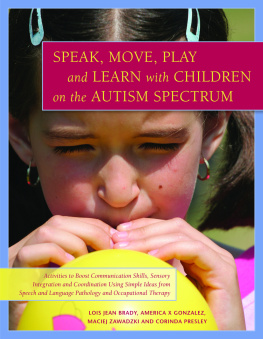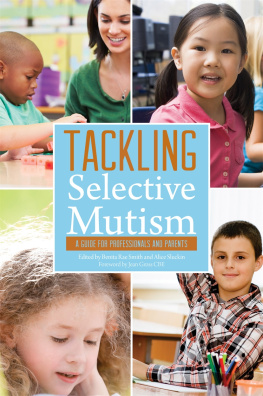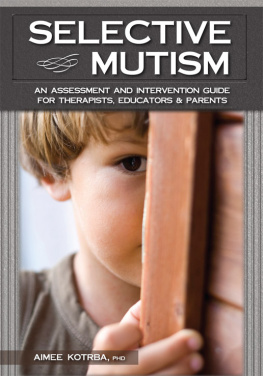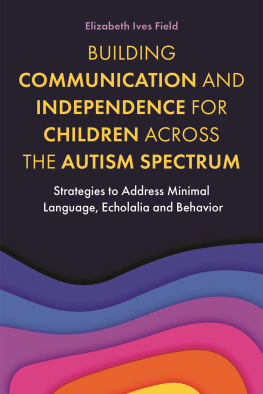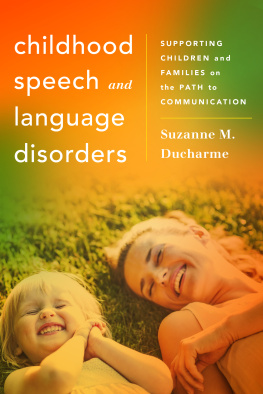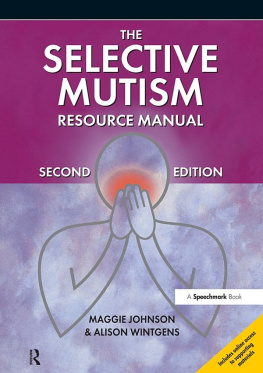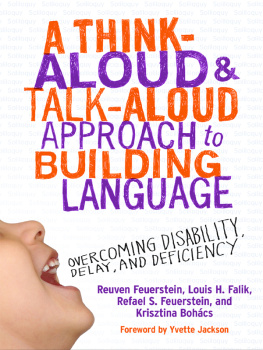Expanding Receptive and Expressive Skills Through Stories (EXPRESS)
Language Formulation in Children With Selective Mutism and Other Communication Needs
Expanding Receptive and Expressive Skills Through Stories (EXPRESS)
Language Formulation in Children With Selective Mutism and Other Communication Needs
Evelyn R. Klein, PhD, CCC-SLP, BCS-CL
Sharon Lee Armstrong, PhD
Janice Gordon, MS, CCC-SLP
Donna Spillman Kennedy, MS, CCC-SLP
Carolyn Gerber Satko, MS, CCC-SLP
Elisa Shipon-Blum, DO


5521 Ruffin Road
San Diego, CA 92123
e-mail:
Web site: http://www.pluralpublishing.com
Copyright 2018 by Plural Publishing, Inc.
Typeset in 12/14 Palatino by Achorn International
Printed in the United States of America by McNaughton & Gunn
All rights, including that of translation, reserved. No part of this publication may be reproduced, stored in a retrieval system, or transmitted in any form or by any means, electronic, mechanical, recording, or otherwise, including photocopying, recording, taping, Web distribution, or information storage and retrieval systems without the prior written consent of the publisher.
For permission to use material from this text, contact us by
Telephone: (866) 758-7251
Fax: (888) 758-7255
e-mail:
Every attempt has been made to contact the copyright holders for material originally printed in another source. If any have been inadvertently overlooked, the publishers will gladly make the necessary arrangements at the first opportunity.
Library of Congress Cataloging-in-Publication Data:
ISBN-13: 978-1-63550-050-9
ISBN-10: 1-63550-050-8
Contents
Appendices
To say that I have been touched by selective mutism (SM) is an understatement. From a personal standpoint, understanding and treating SM has been my lifes work and passion. Having been touched by SM when my daughter was 3-1/2 years old, I realized the scarcity of knowledge in this area. Many children are misunderstood, misdiagnosed, and mismanaged.
Its been my lifes work to help children with SM have their voices heard. As a physician, I began working with families whose lives were touched by this often misunderstood disorder. I started applying my medical knowledge to help them overcome SM. Within my clinical practice at the Selective Mutism Anxiety Research and Treatment Center (SMart Center), which focuses on understanding and treating SM, I realized early on that SM was more than not speaking and there are reasons for the development and maintenance of it.
Based on my experience over many years working with thousands of children with SM, I developed the Social Communication Anxiety Treatment (S-CAT) approach. To validate this approach, two professors at La Salle University, Dr. Evelyn Klein, a speech-language pathologist and psychologist, and Dr. Sharon Lee Armstrong, a psycholinguist, became the principal investigators of the published study, Social Communication Anxiety Treatment (S-CAT) for children and families with selective mutism; A pilot study (Klein, Armstrong, Skira, & Gordon, 2017). With support from the Selective Mutism Research Institute (SMRI), results showed that children with SM made significant progress in the families and schools where the recommended treatment strategies were implemented.
S-CAT was designed to increase social comfort and progression of communication with the ultimate goal of increasing verbal output, and it does. However, at the SMart Center we became aware that there were some children who had speech and/or language deficits in addition to their selective mutism. Klein, Armstrong, and Shipon-Blum (2013) developed a technique that enabled identification of these speech and language issues in children with SM even though the children do not usually talk with professionals. Through my association with Dr. Klein, I came to appreciate that specialists in communication sciences and disorders could expand the receptive and expressive language skills of those children with SM who also have communication deficits.
An exceptional team inspired the work to come. Evelyn Klein and Sharon Lee Armstrong along with Donna Spillman Kennedy, a speech-language pathologist who had been integrating aspects of my S-CAT philosophies into her clinical practice and providing out-reach to schools, and Janice Gordon, previously a research associate at SMRI and a graduate student with Carolyn Gerber Satko in the Communication Sciences and Disorders Program at La Salle University, became the authors of EXPRESS. They applied many of my S-CAT philosophies into the framework of this innovative program.
S-CAT is based on the understanding that SM is a social communication anxiety disorder and a childs level of anxiety will change from setting to setting and from person to person. Depending on the setting/situation and the childs comfort level, they will move into a different stage of communication. Dr. Klein and authors have incorporated this important aspect of S-CAT into EXPRESS. Where S-CAT uses stages on the Social Communication Bridge, the EXPRESS Program uses levels of communication.
Consistent with S-CAT, EXPRESS recognizes the importance of a facilitator in treatment. Those with social communication anxiety disorders, such as SM, need someone to facilitate treatment strategies for them to progress and build the proper social communication skills. Therefore, it is also critical that the facilitator is able to reduce or increase communication demands on the child based on comfort level. EXPRESS also gives the facilitator (the Reader who may be a speech-language pathologist, teacher, clinician, parent, or others) the opportunity to do this.
A key aspect of S-CAT is helping children acknowledge and assess their anxiety by rating their feelings using feelings charts (e.g., bar graphs, faces, etc.). This emphasis helps children learn coping skills as they feel more in control and can relate to their feelings. The facilitator respects and trusts the child when they indicate something feels scary or hard and then guides them with strategies appropriate to their comfort level. This allows for more rapport and trust. Within the EXPRESS Program, these same concepts are applied.
Within EXPRESS, as in S-CAT, the philosophy focuses on ways to initially minimize processing demands. This is beneficial because anxiety disrupts processing and hence reduces thinking capacity and speed. Reasons for the anxiety vary from child to child. While some children with SM may have other anxieties in addition to communication anxiety, many have speech and language deficits and delays, which can further increase anxiety and reduce their ability to communicate effectively. All or some of these sources of anxiety may lead to the development and maintenance of SM. Treatment that focuses on ways to help lower anxiety enables a child to become more communicative. This is also true when working with children who have learning challenges, sensory issues, autism, or difficulties with bilingualism.
The EXPRESS Program reduces anxiety and processing load by using visuals such as pictures and words as well as providing choices and scripted questions in the story activities.
The EXPRESS Program is an excellent adjunct to a comprehensive treatment program for SM and related social communication disorders. It is also a stand-alone tool to help develop receptive and expressive language skills in children at varying stages of language development, even those without SM. The EXPRESS Program provides the child with structured activities using engaging stories and visual materials for learning vocabulary, question-answer routines, story grammar, sentence structures, phonemic awareness, and story generation.
Next page

